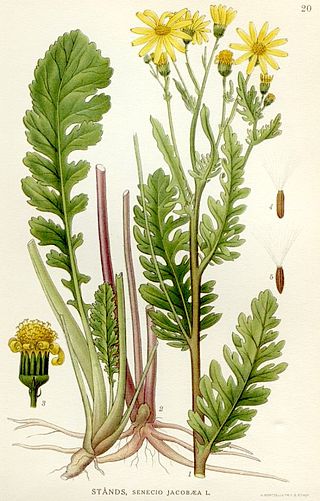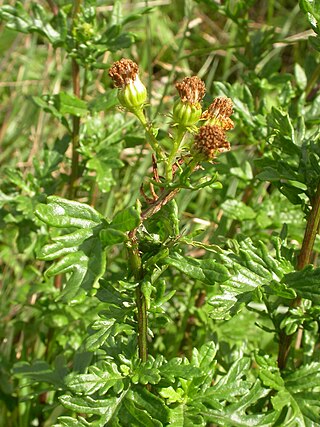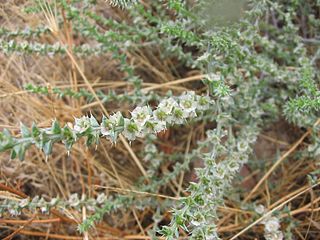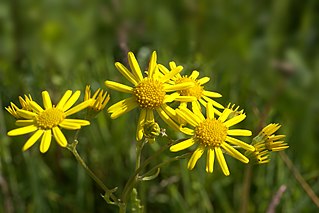
The family Asteraceae, with the original name Compositae, consists of over 32,000 known species of flowering plants in over 1,900 genera within the order Asterales. Commonly referred to as the aster, daisy, composite, or sunflower family, Compositae were first described in the year 1740. The number of species in Asteraceae is rivaled only by the Orchidaceae, and which is the larger family is unclear as the quantity of extant species in each family is unknown.

Senecio is a genus of flowering plants in the daisy family (Asteraceae) that includes ragworts and groundsels.

Jacobaea vulgaris, syn. Senecio jacobaea, is a very common wild flower in the family Asteraceae that is native to northern Eurasia, usually in dry, open places, and has also been widely distributed as a weed elsewhere.

Senecioneae is the largest tribe of the Asteraceae, or the sunflower family, comprising over 150 genera and over 3,500 species. Almost one-third of the species in this tribe are placed in the genus Senecio. Its members exhibit probably the widest possible range of form to be found in the entire plant kingdom, and include annuals, minute creeping alpines, herbaceous and evergreen perennials, shrubs, climbers, succulents, trees, and semi-aquatic plants.

Jacobaea maritima, commonly known as silver ragwort, is a perennial plant species in the genus Jacobaea in the family Asteraceae, native to the Mediterranean region. It was formerly placed in the genus Senecio, and is still widely referred to as Senecio cineraria; see the list of synonyms (right) for other names.

Jacobaea is a genus of flowering plants in the tribe Senecioneae and the family Asteraceae. Its members used to be placed in the genus Senecio, but have been separated into the segregate genus Jacobaea on the basis of molecular phylogenetics in order to maintain genera that are monophyletic.

Centaurea cineraria, the velvet centaurea, is also known as dusty miller and silver dust. Centaurea cineraria is in the family Asteraceae and is endemic to Italy. In natural settings, it grows on coastal cliffs, ranging from 0–350 m above sea level. Mature plants may reach 80 centimetres (31.5 in) in height. Centaurea cineraria produces purple flowers.
Dusty Miller may refer to:

Achnatherum is a genus of plants which includes several species of needlegrass. Several needlegrass species have been switched between Achnatherum and genus Stipa; taxonomy between the two closely related genera is still uncertain.

Jacobaea adonidifolia is a species of the genus Jacobaea and the family Asteraceae.

Jacobaea erucifolia, the hoary ragwort, is a species of the genus Jacobaea and the family Asteraceae.

Jacobaea gibbosa is a species of the genus Jacobaea and the family Asteraceae.

Jacobaea paludosa, syn. Senecio paludosus, the fen ragwort, is a species of the genus Jacobaea and the family Asteraceae that can be found in northern Italy, and everywhere in Europe.

Pieter B. Pelser is a lecturer in Plant Systematics and the curator of the herbarium at the University of Canterbury in Christchurch, New Zealand. One research interest is the evolutionary history of the tribe Senecioneae, one of the largest tribes in the largest family of flowering plants. He wrote the most recent attempt to define and delimit this tribe and its problematic founding species Senecio. He also studies insects that eat these plants (Longitarsus) which contain pyrrolizidine alkaloids and what makes them choose which plants they eat.

Omalotheca is a genus of flowering plants in the daisy family. It is commonly known as arctic cudweed.

Kali is a genus of plants in the subfamily Salsoloideae in the family Amaranthaceae. Common names of various members of this genus include buckbush, rolypoly, tumbleweed for its wind-blown seed dispersal habit, and Tartar thistle and Russian thistle for its origins.

Jacobaea aquatica or Senecio aquaticus, the water ragwort or marsh ragwort, is a plant of the family Asteraceae. It is a perennial or biennial plant: young plants form a rosette near the ground, eventually producing a taller flowering shoot with many bright yellow flower heads, each with prominent ray florets. It grows in damp, grazed grassland, especially where there has been some disturbance.
Jacobaea trapezuntina, the Trapezuntian groundsel, is a herbaceous plant, a member of the family Asteraceae.

Roemeria is a genus of flowering plants in the family Papaveraceae, native to Macaronesia, Europe, the Mediterranean, North Africa, the Caucasus, the Middle East, the Arabian Peninsula, Central Asia, the western Himalayas, Pakistan, Xinjiang, and Mongolia. A 2006 molecular analysis revised the taxonomy of Papaver, elevating Roemeria to the genus level, and including the species formerly in Papaver sect. Argemonidium.

Oreomecon is a genus in the poppy family Papaveraceae. It was established in 2022 for what was previously treated as Papaver sect. Meconella in order to ensure that the genus Papaver was monophyletic. As of June 2023, names in the genus Oreomecon had only been published for better known and phylogenetically understood species present in Europe, either as natives or aliens.


















